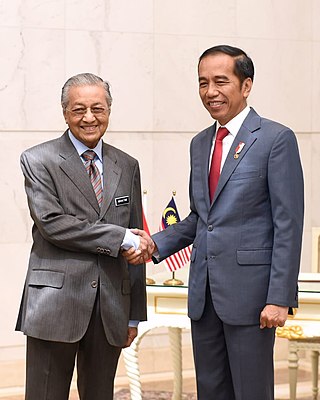
Since independence, Indonesian foreign relations have adhered to a "free and active" foreign policy, seeking to play a role in regional affairs commensurate with its size and location but avoiding involvement in conflicts among major powers. During the presidency of Sukarno, Indonesia's foreign relations were marked by engagement with other newly independent nations in Asia and Africa, as exemplified by the Bandung Conference, the subsequent foundation of the Non-Aligned Movement and a confrontational attitude towards Western powers, justified by a belief in the CONEFO and opposition to what Sukarno termed as NEKOLIM.

Hungary–Indonesia relations refer to bilateral relations between Hungary and Indonesia. The two countries established diplomatic relations in 1955. A Hungarian embassy was opened in Jakarta in 1957. In line to Hungarian "Eastern Opening" policy, and due to Indonesian political weight and market potentials, Hungary considered Indonesia as one of the most influential states in the ASEAN. While Indonesia sees Hungary as a potential market and a strategic entrance to penetrate the markets of Central Europe and Eastern Europe. Hungary has an embassy in Jakarta and honorary consuls in Bandung and Denpasar, while Indonesia has an embassy in Budapest.
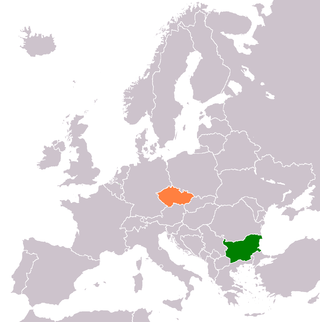
Bulgaria–Czech Republic relations are foreign relations between Bulgaria and the Czech Republic. Diplomatic relations between Bulgaria and Czechoslovakia were established on 27 September 1920, after ratification of Neuilly treaty. They were severed on 1 June 1939 and were restored on 10 October 1945. Interwar relations were deeply influenced by Yugoslavia, Czechoslovakian ally, but Bulgarian rival. Czechoslovakia had to balance between Bulgaria and Yugoslavia. The most important aspect of Bulgaria–Czechoslovakia relationship was trade. The Czechoslovakian interwar export to Bulgaria varied between 3% and 11% of the Bulgarian import. Otherwise it was about 0.5%. Czechoslovakian export was slowly forced out by Germany in the late thirties, but not as much as France or United Kingdom.
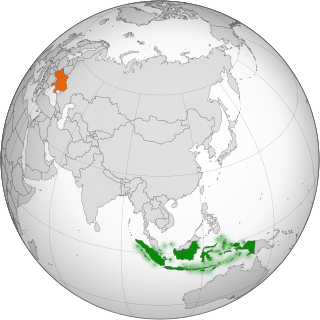
Indonesia and Ukraine established diplomatic relations in 1992. Indonesia has an embassy in Kyiv that also accredited for Georgia and Armenia, while Ukraine has an embassy in Jakarta. Both nations has agreed to expand cooperations in heavy industries, military, space technology and exploration, tourism, sports, economy and trade sectors, as well as cooperations within international organizations.
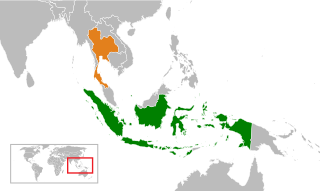
Indonesia and Thailand have officially established diplomatic ties on 7 March 1950. The two countries have since enjoyed a cordial bilateral relationship. Both countries have established embassies in each capitals, Indonesia has their embassy in Bangkok and consulate in Songkhla, while Thailand has their embassy in Jakarta. High rank stately visits has been conducted for years. Both nations are the founders of ASEAN and the members of Non-Aligned Movement and APEC. Indonesia and Thailand are viewed as natural allies. Indonesia is also appointed as observer in Cambodian–Thai border dispute.

Egypt and Indonesia established diplomatic relations in 1947. Both are Muslim-majority countries with significant non-Muslim minorities. Indonesia has an embassy in Cairo and Egypt has an embassy in Jakarta. Both countries are members of the Organisation of Islamic Cooperation, Non-Aligned Movement, the G20 developing nations and Developing 8 Countries. Egypt was also the first sovereign country to recognise Indonesia's independence; doing so in 1946, three years before its formal, internationally-recognised independence date.
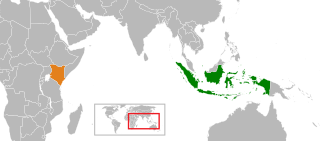
Indonesia and Kenya established diplomatic relations in July 1979. Indonesia has an embassy in Nairobi, also accredited to Mauritius, Seychelles, and Uganda, and in 2022 Kenya established its embassy in Jakarta. Both nations are partners in multilateral organizations, such as the World Trade Organization (WTO) and Non-Aligned Movement.

Indonesia and Spain established diplomatic relations in 1958. Spain identifies Indonesia as their natural ally and has named Indonesia as one of their priority nations in their foreign relations with the Asia-Pacific region. Indonesia has an embassy in Madrid and consulates in Barcelona and Las Palmas, while Spain has an embassy in Jakarta and a consulate in Seminyak, Bali. Today, the cooperation has expanded to various fields, including trade, culture, education, and defense technology.

Indonesia and Venezuela established diplomatic relations in 1959. Since then, both countries enjoy friendly ties. Both nations agreed to expand the trade and investment relations, especially in tourism, technology, chemicals and natural gas sectors. Indonesia has an embassy in Caracas, while Venezuela has an embassy in Jakarta. Indonesia and Venezuela are members of multilateral organizations such as the World Trade Organization (WTO), Non-Aligned Movement and Forum of East Asia-Latin America Cooperation.
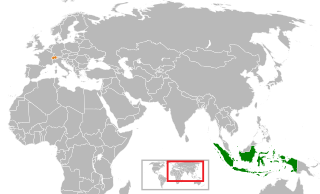
Indonesia and Switzerland established diplomatic relations in 1952. In 2010, the heads of state of the two countries agreed to launch negotiations on a Comprehensive Economic Partnership Agreement (CEPA). Switzerland has named Indonesia as one of seven priority countries for economic development cooperation. Indonesia has an embassy in Bern, while Switzerland has an embassy in Jakarta, also accredited for East Timor and ASEAN.

Austria and Indonesia established diplomatic relations in 1954. Austria recognizes Indonesia as a stable and reliable partner, and both countries enjoy excellent relations. The two nations have agreed to expand relations in business, trade and investment, tourism, culture, environment and green technology. Austria has an embassy in Jakarta and honorary consulates in Yogyakarta, Bandung and Surabaya, while Indonesia has an embassy in Vienna that is also accredited to Slovenia.

Belgium and Indonesia established relations in 1949. Belgium has an embassy in Jakarta and an honorary consulate in Surabaya, and Indonesia has an embassy in Brussels, also accredited to Luxembourg and the European Union.

Jordan and Indonesia established diplomatic relations in 1950. Both are Muslim majority countries who, despite the challenges, wish to promote and projects the Islamic values of tolerance, justice and equality. Both nations often share similar stances upon issues in the Middle East, such as the Syrian Civil War and the Israeli–Palestinian conflict. Economy and trade relations are also particularly important, currently Indonesia is Jordan's largest trade partner in ASEAN. Jordan has an embassy in Jakarta, while Indonesia has an embassy in Amman that is also accredited to Palestine. Both countries are members of the Organisation of Islamic Cooperation and the Non-Aligned Movement.

Indonesia and Norway established diplomatic relations in 1950. Since then, Indonesia and Norway has been cooperating in areas, such as climate and energy, democracy and human rights, international political issues and trade. Both nations has agreed to establish a strategic partnership against poverty and climate change, and also in promoting democracy and tolerance. Indonesia has an embassy in Oslo, while Norway has an embassy in Jakarta.

The Australian Consulate-General in Surabaya represents the Commonwealth of Australia in Surabaya, the second most populous city in Indonesia. The Consulate-General of Australia in Surabaya was established in February 2017, and is the fourth diplomatic mission of Australia in Indonesia after Jakarta (1935), Denpasar (1981), and Makassar (2016). The seat of consulate-general located at Level 3 ESA Sampoerna Center, Sukolilo, Surabaya, East Java. Chris Barnes is the first consul-general in Surabaya. He has been replaced with Fiona Hoggart since December of 2021.



















